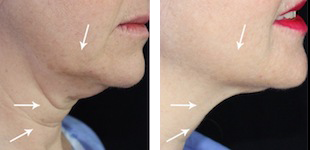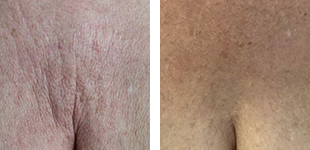Actinic chelitis is sun damage of the lips that is consistent with pre-cancer. Patients with actinic chelitis have dry, non-healing cracked lips with a subtle white discoloration. While the condition itself is not dangerous, it is serious as it increases the risk for skin cancer.
Signs of actinic cheilitis include:
- overall dryness
- tenderness or soreness
- loss of the demarcation between the lower lip and surrounding skin
- inflammation
- breaking or cracking of the skin
- discoloration
Causes And Risk Factors
- Chronic sun exposure: It goes without saying but the more often you are exposed to sunlight, the more at risk you are.
- Severe sunburn: Sunburn further damages skin cells and causes them to divide and regenerate. This increases the chances of cellular mutations.
- Gender (sorry women, you’re 3x more likely to develop actinic cheilitis).
- Smoking: make it more vulnerable to sun damage.
- Excessive alcohol use.
- Certain medical conditions like HPV.
- Medications that weaken and suppress the immune system usually increase the risk of sun damage.
- Everted lower lip: When the lip is turned more outward instead of inward it has more sun exposure.
In order to decrease your risk of developing this condition, we highly suggest that you:
- limit your sun exposure, especially during peak sun hours.
- apply sunscreen to your face and lips.
- wears wide rimmed hats that cover your face.
- applying moisturizer to dry and cracked lips.
- decrease alcohol and tobacco use.
Treatment Options For Actinic Chelitis
These lesions require treatment because they can turn into squamous cell carcinoma of both the skin or the oral mucosa (lining of the inner mouth).
Dr. Kormeili can determine the best course of treatment for your skin condition after careful examination. Please contact us to schedule an appointment.




